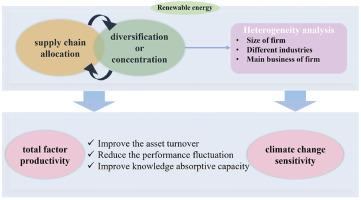可再生能源的供应链配置和全要素生产率
IF 16.3
1区 工程技术
Q1 ENERGY & FUELS
引用次数: 0
摘要
在全球经济环境高度不确定的背景下,探讨供应链配置与可再生能源企业全要素生产率(TFP)之间的关系,不仅有助于优化可再生能源扶持政策,还能保证供应链的抗风险能力,促进能源转型的微观基础。本研究基于2010-2022年中国可再生能源上市企业数据,从企业供应链角度系统验证了多元化与集中化相对选择对可再生能源企业全要素生产率的影响。研究结果表明(1)供应链多元化可以提高可再生能源企业的全要素生产率,但供应链配置对中小型企业的影响更为显著。(2)通过机理分析发现,供应链多元化主要通过提高资产周转率、减少绩效波动、提高知识吸收能力三个渠道提高可再生能源企业的全要素生产率。(3)研究发现,与其他行业相比,可再生能源企业更容易受到气候变化的影响,这是造成可再生能源供应链配置异质性影响的主要原因。基于以上研究,本研究提出了优化可再生能源企业供应链的政策建议,使可再生能源企业在降低成本、提高效率的同时,降低潜在的波动风险。本文章由计算机程序翻译,如有差异,请以英文原文为准。

Supply chain configuration and total factor productivity of renewable energy
In the context of a highly uncertain global economic environment, exploring the relationship between supply chain allocation and total factor productivity (TFP) of renewable energy enterprises not only helps to optimize the support policy for renewable energy but also ensures the resilience of supply chain and promotes the micro foundation of energy transition. Based on the data of listed renewable energy enterprises in China from 2010 to 2022, this research systematically verifies the impact of the relative choice of diversification and concentration on the TFP of renewable energy enterprises from the perspective of the enterprise supply chain. The results show that: (1) Supply chain diversification can improve the TFP of renewable energy enterprises, but the impact of supply chain configuration on small and medium-sized enterprises is more significant. (2) Through mechanism analysis, it is revealed that supply chain diversification can improve the TFP of renewable energy enterprises mainly through three channels: improving the asset turnover, reducing the performance fluctuation, improving the knowledge absorptive capacity. (3) Compared with other industries, it is found that renewable energy enterprises are more vulnerable to the impact of climate change, which is the main reason for the heterogeneous impact of renewable energy supply chain configuration. Based on the above research, this study proposes policy suggestions to optimize the supply chain of renewable energy enterprises, so that renewable energy enterprises can reduce the potential fluctuation risk, by taking into account the cost reduction and efficiency increase.
求助全文
通过发布文献求助,成功后即可免费获取论文全文。
去求助
来源期刊

Renewable and Sustainable Energy Reviews
工程技术-能源与燃料
CiteScore
31.20
自引率
5.70%
发文量
1055
审稿时长
62 days
期刊介绍:
The mission of Renewable and Sustainable Energy Reviews is to disseminate the most compelling and pertinent critical insights in renewable and sustainable energy, fostering collaboration among the research community, private sector, and policy and decision makers. The journal aims to exchange challenges, solutions, innovative concepts, and technologies, contributing to sustainable development, the transition to a low-carbon future, and the attainment of emissions targets outlined by the United Nations Framework Convention on Climate Change.
Renewable and Sustainable Energy Reviews publishes a diverse range of content, including review papers, original research, case studies, and analyses of new technologies, all featuring a substantial review component such as critique, comparison, or analysis. Introducing a distinctive paper type, Expert Insights, the journal presents commissioned mini-reviews authored by field leaders, addressing topics of significant interest. Case studies undergo consideration only if they showcase the work's applicability to other regions or contribute valuable insights to the broader field of renewable and sustainable energy. Notably, a bibliographic or literature review lacking critical analysis is deemed unsuitable for publication.
 求助内容:
求助内容: 应助结果提醒方式:
应助结果提醒方式:


